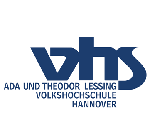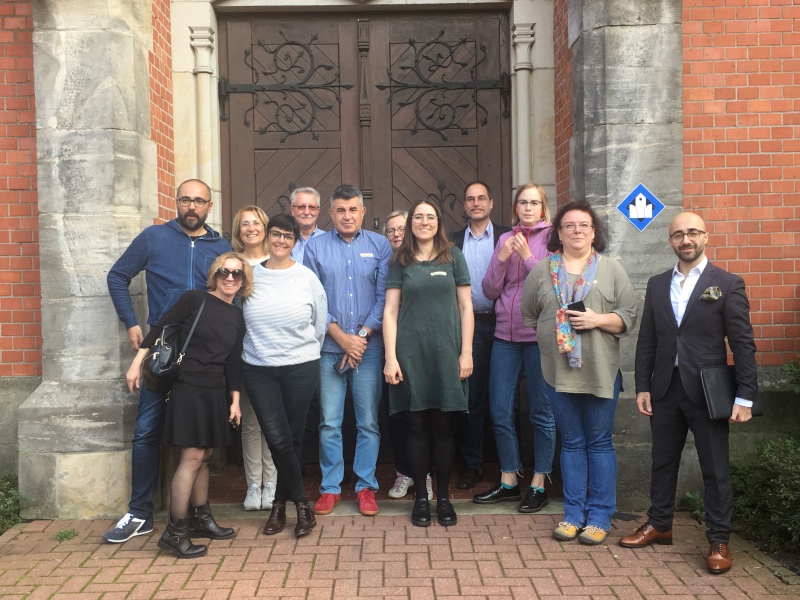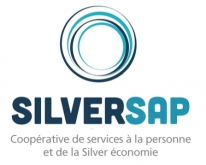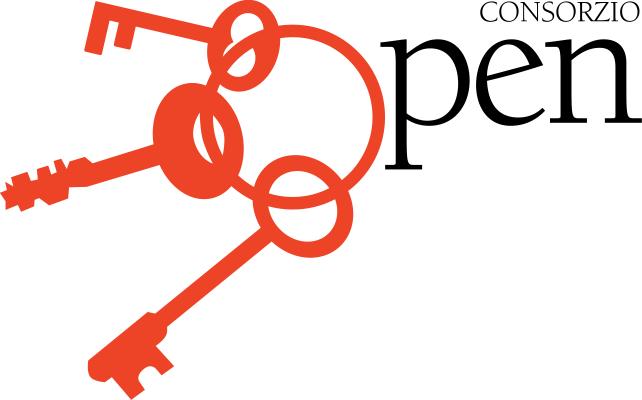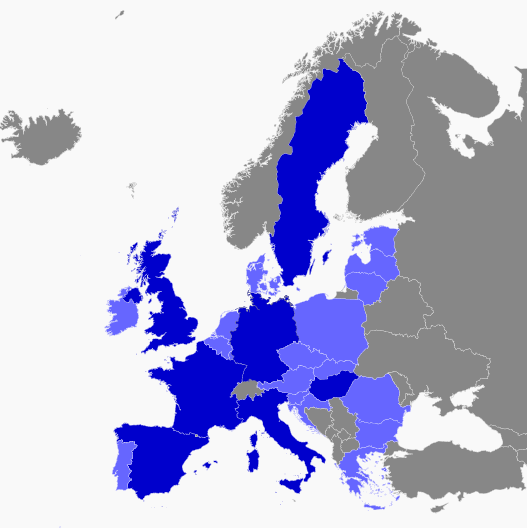Stephansstift ZEB is an adult education center under the roof of Stephansstift Foundation which again is part of the umbrella organization Dachstiftung Diakonie with around 3500 employees.
Stephansstift foundation has a long history in social work and social inclusion. It has youth and family welfare activities, childrensâ daycare centres, special needs schools, an adult education centre with boarding home, vocational schools, and several residential and care homes for the elderly.
As part of the clerical and social welfare (Diakonie) Stephansstift ZEB (Centre for Adult Education) is a provider for general adult education and professional education for the social sector in Hannover, Germany. It follows the concept of Grundtvig as a âHeimvolkshochschuleâ, which implies the concept of informal learning and living under one and the same roof and thus bringing together different people. As residential school it employs around 50 people: pedagogues, administration, reception, kitchen and housekeeping staff.
Around 20.000 participants per year come to a big variety of non-formal courses or to continuing education and training, mainly in the field of guidance, social services/social work and Diakonie for people in need. A big number of participants are volunteers and multipliers as well as professional social workers and educators working with volunteers and disadvantaged persons for social integration and employability.
Stephansstift Foundation focusses on helping vulnerable groups, rehabilitation and integration into society.
Since 2015 Stephansstift ZEB (Centre for Adult Education) puts a focus on migration and refugees and offers German courses for refugees and also courses for volunteers and professionals that work with refugees and migrants with topics of how to teach German and intercultural competence.
West London Equality Centre, WLEC, (the operational name of Ealing Equality Council) is a Human Rights organisation. Its mission statement is "Advancing equality and rights for all". For over 30 years it has been running the Community Advice Programme (CAP), a legal clinic providing free legal assistance to members of the public. WLEC are specialists in matters related to several areas of law and the Equality Act 2010, delivering key legal services to the minority ethnic, refugee and migrant communities in West London.
WLEC has Human Rights expertise at every level of the organisation from governance to frontline delivery and shaping local and subregional policy. This makes WLEC unique to West London. This is as a result of:
- WLECâs relationship for over 30 years with the University of West London [UWL], its law department, law tutors and law students, we have found ourselves operating at the forefront of the equality and human rights agenda. For several years WLEC has been strategically positioned as the leading Equality and Human Rights champion for this part of London.
- The Management Committee being composed of Human Rights specialists /academics/ practitioners â and volunteers drawn from the social sciences and legal disciplines, familiar with human right issues, both international and domestic.
- Trustees include a wide range of distinguished academics and experienced legal practitioners including Professor Kwame Akuffo, retired judge Bernard Andonian, Solicitor Barbara Karayi, and Barrister Josephine De Souza.
- WLEC staff and trustees have advised EHRC on human rights issues and advised Southall Black Sisters in their case against Ealing Council when the local authority threatened to decommission a separate domestic violence service for BMER women.
- Our Anti-Hate Crime work has included Hate Crime support services in Hounslow (funded by Hounslow Council) and West London (funded by London Mayors Office). The Hounslow service was cited as a model of good practice by the Deputy Mayor of London and lead on Hate Crime in the capital. We are also members of the pan-London MOPAC Hate Crime delivery group for thirty-two municipalities. With the support of the National Lottery Community Fund, we are in the second cycle of our hate crime tackling project providing multidimensional approach of victimsâ support, bringing perpetrators to justice, facilitating awareness campaigns, and increasing statutory and voluntary sector collaborative working to combat hate crime.
- Our previous international projects include SMART: Funded by the EU, a partnership with Ealing Council and Italian VCSE partners delivering a migrant assisted returns service, based on âouthouse/shedâ housing abuses and other issues uncovered by LBE, the Police and WLEC. Our organisation delivers help and advice to mainly vulnerable people in matters related to undocumented migrants, homeless families not entitled to public funds, trafficking, forced labour, immigration advice, etc, using Human Rights and other law to achieve better outcomes. The MILAR project aimed to integrate Refugees and Asylum seekers into society economically by way of employment, socially and through education. Working closely with multiple organisations, both from a national and international platform including Germany, Sweden and Italy; the project was based on researching and developing social community enterprise and most importantly the implementation of a successful pattern tested model. The West London Equality Centre carried out and conducted the United Kingdom aspect of the work. The project was aimed to evaluate and apply a âbottom-upâ approach specifically by empowering individuals, providing refugees and at least 24 asylum seekers with the skills, knowledge, and tools to enable their individual development, thus increasing community cohesion.
- In our generalist and specialist advice, (ongoing for over 30 years in Ealing), we provide advocacy and casework service, through highly motivated law graduates and undergraduates who have studied Human Rights as part of their legal training. In partnership with the Community Advice Programme, we service annually thousands of enquiries consisting of telephone advice, face-to-face triage for drop-in clients without phones, internet, etc, face-to-face appointment advice clinics, casework, referrals, and signposting.
- In addition to generalist advice WLECâs service covers Domestic Violence, Honour Crimes, Hate Crimes, Human Trafficking, Caste discrimination and other areas relating to equality.
The quality of our service is reflected in our high calibre pro bono volunteers, who have included: Queens Counsels, Judges, Magistrates, Solicitors, Barristers and local law students and our quality assured volunteering programmes.
Adress
84 Uxbridge Road
Ealing, London, W18 8RA
United Kingdom
Tel. +44 20 8231 2575
VHS Hannover (Volkshochschule Hannover), founded in 1919, is a non-profit adult education institution affiliated to the municipality of Hannover, capital of the province of Lower Saxony, Germany. With a salaried staff of 100 (about 75 FTE), plus about 800 freelance teachers, it offers a programme of 115 000 teaching hours per year, attended by 30 000 participants.
The main objective of VHS Hannover, laid down in its statutes, is to help citizens of Hannover (500 000 in the town itself, about 1.2 million in the wider metropolitan area) to actively participate in society and to develop their skills and personality.
The programme includes a wide range of subjects of general, vocational, social and cultural education. They are grouped into the areas of:
- Society, environment, education,
- Culture, creativity, design,
- Health, nutrition, well-being
- Foreign languages
- Basic skills, school-leaving certificates,
- Work, vocational training, career development, IT skills
- Integration and German language courses for immigrants
Courses are offered in VHS Hannoverâs main building in the city centre, in a number of other dedicated locations in various other parts of the city, as well as in neighbourhood schools. Courses include daytime and evening courses, weekend courses and block seminars in accordance with the provincial regulations for âeducation holidaysâ.
VHS Hannover also organises public events, exhibitions, panel discussions on topics of public interest etc. It cooperates with a large number of other public and civic organisations in fields such as culture, social inclusion, and popularisation of education.
One line of activity that distinguishes VHS Hannover from similar organisations is that is responsible for providing Second Chance basic and secondary education to school drop outs (young adults who left compulsory school age without having achieved any degree). There are about 10 classes for such learners on a continuing base, with 20 full-time teachers employed only for this. This activity is commissioned to VHS Hannover by the Hannover municipality.
VHS Hannover is financed through course fees and public subsidies (both from the municipal and the provincial budget). Fees are purposefully low in order to make education accessible for everybody.
VHS Hannover is a member of âDeutscher Volkshochschulverbandâ, a national umbrella organisation of 900 âVolkshochschuleâ type adult education centres. âVolkshochschulenâ are regarded as Germanyâs most visible non-profit providers of general adult education including continuing and vocational training, second-chance education, and all sorts of activities in the field of culture and health education. VHS Hannover is part of the administrative structure of Hannover municipality. Its learning offers are however independently designed, without interference from overall municipal administration.
Quality management certificates issued to VHS Hannover are ZAZAVplus (a quality management system specialized on adult education institutions), and for its vocational further education department also AZAV which entitles VHS Hannover to provide vocational further education by order of the National Employment Agency.
Folkuniversitetet is an adult educational association that offers a wide range of adult education all over Sweden. It is an association of five foundations: the university extensions attached to the Universities of Stockholm, Uppsala, Göteborg, Lund and UmeÄ.
We have a broad open educational program in a variety of subjects; we also run upper secondary schools, schools in higher vocational education, courses for seniors and training, labour market education and further education and training for working life.
Folkuniversitetet is independent of all political, religious and commercial interests.
Values
International cooperation, pedagogic development, democracy and focus on the individual are central values for us.
We have given important contributions to development of Swedish education and training, for example evening gymnasiums, language centres, Swedish for immigrants, college and ICT-based education.
Visions and ideas for better learning methods are developed and tested in project groups, often in international cooperation. Coaching, mentorship, validation, entrepreneurship, learning in working life, empowerment and active guidance based on individual needs are examples of areas we are developing, and implementing to our own organisation.
Folkuniversitetet is engaged in adult education in Sweden. Our idea is that through knowledge and creativity give people opportunities for a richer life.
Knowledge changes! We believe that knowledge is a value in itself, for the individual and for society in general. Folkuniversitetet is an educational association that will be a natural meeting point for people's free search for knowledge - learning, cultural experiences and the opportunity for reflection.
Open to all! We believe that i many different pathways to lifelong learning are needed to benefit all people. The popular education idea â everyone's lifelong right to freely search for knowledge â permeate our education, our organization and our values.
Folkuniversitetetâs starting point is that each person has needs for knowledge and our wide range of courses are available to all. When we plan and execute our activities we always start from the needs of the individual.
Size and Scope of Activity
Folkuniversitetet consists of five legally independent trusts, regional offices, with local branches throughout Sweden. The national office is located in Stockholm. Every year, we welcome over 140,000 students to a variety of lectures, short courses or full-time study programs with a duration ranging from six months to two years.
Financing
Folkuniversitetet receives a certain degree of public financial support, but most activities are financed by course fees from private individuals, businesses and funding from the public sector. Our annual turnover is approximately EUR 120 million.
Staff
We employ around 400 teachers on a full-time basis and a further 6,000 part-time. An administrative staff of some 500 people takes care of administration and development
History
Folkuniversitetet first emerged as a national organisation in 1942, but its origins can be traced back to 1917 and the creation of an association for the development of a peopleâs university. By the 1930s, university students and teachers were organising evening courses and lectures for people lacking formal qualifications.
In 1947, Folkuniversitetet was established as a state supported organization within adult education, an open university in the true sense of the word.
During the 1950-1960s we rapidly developed as the main supplier in Sweden of foreign language courses and Swedish for immigrants.
In the 1970s and 1980s Folkuniversitetet became a leading actor in lifelong learning.
Adress
Skomakargatan 8
22002 Lund, Sweden
The Have Your Say project was done by eight* organisations from seven European countries:
- VHS Hannover (coordinator), Germany
- ZEB Stephansstift (Germany)
- Consorzio OPEN (Italy)
- Nevelök Haza Egyesulet (Hungary)
- West London Equality Centre (UK)
- COOP SAPSE - Coopérative d'Activité et d'Emploi dans les Services à la Personne et la Silver Economie (France, Corsica)
- Folkuniversitetet Stiftelsen vid Lunds Universitet, Sweden
- CEPA San CristĂłbal (Spain, Teneriffe)
- Europahaus Aurich (Aurich, Germany)
*Actually they were nine, but Stephanstift ZEB had to leave by the end of 2021 for unpredictable reasons, and its place was then taken by Europahaus Aurich.
The city: San CristĂłbal de la Laguna
Canary Islands is an archipelago lying to the west of the African Western Sahara, and is one of the so-called outermost regions of the European Union. ItÂŽs 1200 km far from the mainland.
Main income is from tourism. Visitors can enjoy not just the weather and beaches, but also a great variety of natural areas. Canary Islands are one of the most extensively protected territories in Europe, with 42 per cent of the territory under some level of environment protection.
San Cristobal de La Laguna is a city and in the northern part of the island of Tenerife. With 150,000 inhabitants, the city is the third city in population of the region. La Laguna's historical center was declared a World Heritage Site by UNESCO in 1999.
According to data from National Institute of Statistics for the third quarter of 2018, the rate of unemployment was 18.56 %, which is more than seven percentage points above the national rate and second among all Spanish regions. Canary Islands have one of the highest rate of unemployment in EU.
The institution: CEPA San CristĂłbal
It is precisely on this context where CEPA San Cristobal provides its offer in adult education.
 The institution started in 1963 when the aim was to finish with the high levels of illiteracy in Spain. The town hall collaborated by providing facilities: first classrooms were located in the old seminary, primary schools, and others. When this campaign finished in 1973 programs of Adults' Lifelong Education (EPA) were organized. The centre started offering basic degrees training. In 1985 our offer increased with a variety of workshops related to typing, hairdressing , dressmaking, computer basic muse, etc.
The institution started in 1963 when the aim was to finish with the high levels of illiteracy in Spain. The town hall collaborated by providing facilities: first classrooms were located in the old seminary, primary schools, and others. When this campaign finished in 1973 programs of Adults' Lifelong Education (EPA) were organized. The centre started offering basic degrees training. In 1985 our offer increased with a variety of workshops related to typing, hairdressing , dressmaking, computer basic muse, etc.
Since 2000 CEPA San Cristobal is located in a main central building and a wide net of auxiliar spaces. Since then other studies have been added, such as Nursing and English distance learning. Nowadays, CEPA San Cristobal has increased the number of external classrooms due to the growing amount of adult learners that register for a course every year.
Scope of Activities
- Basic literacy targeted to elder early school leavers. (9 groups)
- Secondary basic degree training, required either for professional purposes or to continue studying further training programs. (21 groups)
- VET course for Assistants in Nursing. (2 groups)
- English as a foreign language. (4 groups)
- Access course to vocational training for adults with experience but without suitable qualifications . (3 groups) Number of students (2019): 950
Staff:
- 19 full time teachers
- 36 part time teachers (figures from 2019)
Contact:
Tel. +34 922 260656
E.mail: This email address is being protected from spambots. You need JavaScript enabled to view it.
Website: http://www3.gobiernodecanarias.org/medusa/edublog/cepasancristobal/
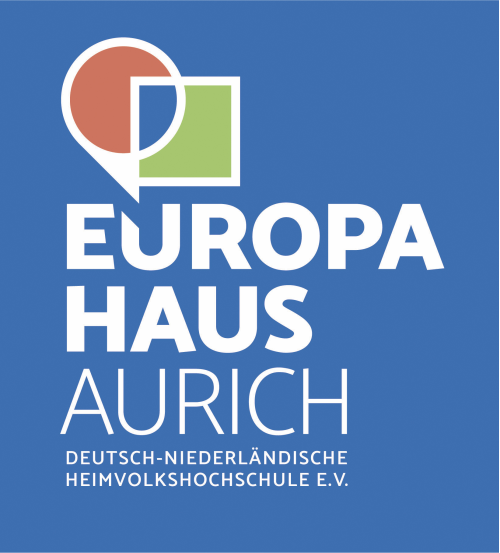 Europahaus Aurich is an adult education and civic education facilities in Aurich, the main city of the region of Eastern Frisia, right across the border ot the Netherlands. It has a hotel facility to accommodate up to 80 guests, and offers training events (typically week-long seminars and workshops) both for the people in the region and for international guests, youth and young adults being one of the most frequent users.
Europahaus Aurich is an adult education and civic education facilities in Aurich, the main city of the region of Eastern Frisia, right across the border ot the Netherlands. It has a hotel facility to accommodate up to 80 guests, and offers training events (typically week-long seminars and workshops) both for the people in the region and for international guests, youth and young adults being one of the most frequent users.
With the aim of reconciliation between Dutch and Germans, after the time of fascism and the resulting 2nd World War, the Europahaus Aurich was founded as an educational institution of the "Verein Deutsch-NiederlÀndische Heimvolkshochschule e.V." in 1956. The organisations stands for German-Dutch cooperation, for a European perspective and democracy. The title "Europahaus" was added in 1970 to expresses our striving for a peaceful coexistence in Europe.
Europahaus Aurich is dedicated both to the region of Eastern Frisia and to international reconsiliation. It is committed to contributig to an ecologically, economically and socially sustainable future.
Europahaus Aurich is situated right in the centre of Aurich, on the grounds of several neighbouring houses once owned by wealthy families of the region.
Address
Website
https://www.europahaus-aurich.de/
Coopérative d'Activité et d'Emploi dans les Services A la Personne et la Silver Economie
COOP SAPSE Corsica is a cooperative providing business support programme for unemployed people in general and notably for disadvantaged women willing to (re)integrate the labour market or to create an economic activity. Its field of activy can be described as: Cooperative Activities and Employment in Human Services and Silver Economy.
Background
The creation of the first Cooperative for the Development of Employment in Services for People and the Silver Economy (COOP SAPSE) is part of an agreement signed by General Confederation of SCOP, the National Agency for Services to People (ANSP), the Ministry of Employment and Social Cohesion and Crédit Coopératif (bank of the enterprises of the social economy).
Its mission, that includes a test phase for entrepreneurs on a trial basis, has received support from:
- region of Corsica,
- COOP SAPSE - national network of cooperative in services to person sector,
- General Confederation of SCOP - production cooperative entreprises,
- Caisse de DĂ©pĂŽts et Consignations (CDC) - French public financial institution and
- Macif foundation - foundation to encourage and support new research projects in the field of risk prevention.
COOP SAPSE Corsica has a county agreement and is positioned on the "comfort" services market, under the trade name of âDolce Casa Servicesâ: cleaning, ironing, small gardening or do-it-yourself, computer assistance, babysitting / child servicesâŠ
COOP SAPSE Corsica aims at promoting economic initiative by enabling project managers to create business scale testing economic feasibility of their project while learning responsibility for their own activity and to better understand the functions of the entrepreneurs in real situations.
This social and economic innovation ensures reversibility and easy access to business creation.
Scope of Activities
More generally, COOP SAPSE Corsica activities are: âą Coaching for creation and recovery of economic activity, âą Implementation of a transitional phase of testing an economic activity (6-18 months) through a specific French contract, âą Monitoring of individual activity during test phase (accompanying accounting, advance management, implementation of research funding, with the creation of the company ...), âą Follow-up after creation by the entrepreneur, âą Test of activity: business incubator, âą Funding of social and solidarity economy.
Coaching Programme
COOP SAPSEâs activity includes a coaching programme aiming at developing specific social skills needed by managers (tasks execution, personal initiatives, ability to anticipate and respond effectively to change, cultural and social differences, leadership, management of emotions, ability to negotiate with others, learning new things/ innovationsâŠ).
Address
Les Terrasses du Fango - Batiment D
Rue du juge Falcone
20200 Bastia, Corsica, France
Tel. +33 603 615379
NevelĆk HĂĄza EgyesĂŒlet (NHE), or in English: Educatorsâ Centre Association, is one of the leading NGOs of Hungary, operating numerous projects and a community centre in the city of PĂ©cs in cooperation with the local municipality.
Location
PĂ©cs is the fifth largest city in Hungary, located on the slopes of the Mecsek mountains in the South-West part of the country, close to its border with Croatia. It is the administrative and economical centre of Baranya county. It has around 140 000 inhabitants.
PĂ©cs has always been a multicultural city where many cultural layers are encrusted melting different values of the history of two thousand years. Hungarians, Croatians and Swabians still live in peace together in economic and cultural polarity.
In 1998 PĂ©cs was given the UNESCO prize âCities for peaceâ for maintaining the cultures of the minorities, and also for its tolerant and helping attitude toward refugees of the Balkan Wars.
In 2010 PĂ©cs was selected to be the European Capital of Culture sharing the title together with Essen and Istanbul. in 2017 PĂ©cs won the award of UNESCO Global Learning Cities. Still the region is among the 20 economically most under-developed regions of the EU.
Mission
NHEâs aims are to support the civil grass-root movements with its internal and external resources in order that they can grow and strengthen, be more active and by doing so they can encourage the growth of their closer and wider surroundings. NHE provides services, training activities and educational programmes according to the principles of sheltering, counselling, empowerment and organizational development as well as lifelong learning priorities.
History
NHE was founded in 1993, and has been working for the development of the civil society for the last 26 years. Since 1997 the organization sustains the House of Civic Communities that helped to launch several local civil organizations. Currently more than 90 communities - formal and non-formal civil movements - are operating in the building, while NHE acts as an umbrella organisation for their benefit. Besides its infrastructural capabilities, NHE provides services and learning possibilities for the NGOs, training activities, forums, research, conferences, professional consultancy, etc. Over 50 000 visitors were registered in 2018.
Major Activities
The Association currently performs the following major functions:
- Providing consultancy and organizational development activities for non-governmental organizations as regional Civil Centre;
- Operating the Baranya County Volunteer Centre for local volunteers and host organizations as well as a community café as the association's social enterprise;
- Organizing cultural and society events, exhibitions, concerts, performances for the local audience;
- Providing non-formal learning occasions for seniors, adults, disadvantaged groups (e.g. single mothers, Roma, disabled, etc.);
- Coordinating every year the Learning City Festival of PĂ©cs (UNESCO Global Learning City Awarded) in cooperation with the municipality of PĂ©cs, the University of PĂ©cs and several local and regional NGOs, for-profit actors and other social, cultural, educational, environment protection, etc. institutions;
- Participating in and managing several national and international projects.
Cooperation
NHE has managed several national and international EU funded projects as well since years. NHE maintains a 20-year-old fruitful working relationship with the Municipality of PĂ©cs and carries out public services and functions for nearly 20 years.
Staff and Volunteers
The everyday work is regularly assisted by more than fifty volunteers and 19 employees.
Memberships
NHE is the member of some international networks like EAEA, REIN, as well as national ones like proHĂĄlĂł Network, Civil Centres in Hungary, Network of Volunteer Centres.
Address
NevelĆk HĂĄza EgyesĂŒlet
Szent Istvån tér 17
7624 PĂ©cs,Hungary
Tel.: +36 (0)72 215543
E-mail: This email address is being protected from spambots. You need JavaScript enabled to view it.
Website: www.ckh.hu/nevelok-haza-egyesulet
Consorzio OPEN is an association of 8 Italian organisations working on a regional or national level. - CEFAL - Emilia Romagna Region - Techné - Emilia Romagna Region - Istituto Don Calabria in Veneto, Emilia Romagna and Sicily Region - Cooperativa sociale A&I (Accoglienza e Integrazione) in Lombardia Region - Fondazione Casa di Carità in Piemonte Region - Scuola Centrale di Formazione Emilia Romagna Region - Coss Marche, Marche Region - Escoop, Puglia Region
Consorzio OPEN has about 3200 actively involved contributors (employees, volunteers, etc.) working with about 34.000 beneficiaries per year. The consortium has 132 offices in 11 regions of Italy: Liguria, Piemonte, Lombardia, Veneto, Friuli, Venezia, Giulia, Emilia Romagna, Marche, Puglia, Basilicata, Sicilia, Sardegna.
Historically, Consorzio OPEN goes back to a project funded by the ESF in 2007. The cooperation of organisations promoting vocational training and working inclusion of young people and adults in situations of social, economic and cultural disadvantage developed into the desire to set up a continuing partnership based on shared goals.
Thus, in 2010, Consorzio OPEN was formed as a national network to combat social exclusion of people with disadvantage through activities and social rehabilitation services and training aimed at redefining a new life project. Beneficiaries are refugees, ex-convicts, ex drug-addicts, disabled, long-term unemployed, school drop-outs and many more. In recent years, working with refugees and immigrants has become a more important focus.
Consorzio OPENâs priority is to develop new systems and strategies to promote social inclusion and employment of people who have a serious social disadvantage and live in the margins.
To this end, OPEN promotes participation of people in training and employment support by promoting initiatives of comparison and debate, such as â inter-professional training for organizational well-being personnel â dialogue between institutions (companies, social economy, citizenship) â Involving local administration, national and European bodies to stimulate change in the policies and practices of public institutions.
Subcategories
Other Projects
The eight organsiations running the HYS project are also active in other Erasmus+ projects. Here we present a selection of them.
Page 1 of 2





